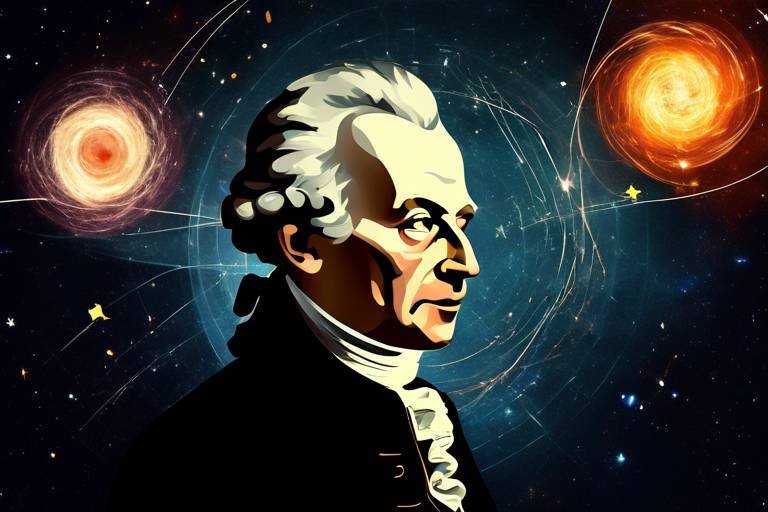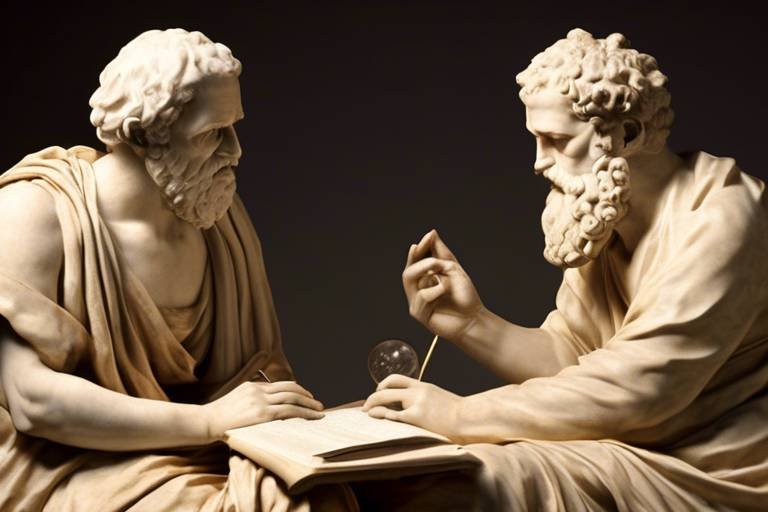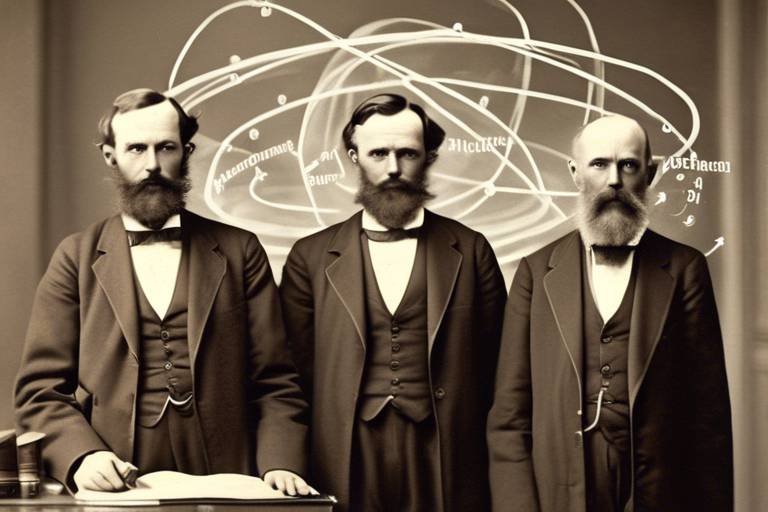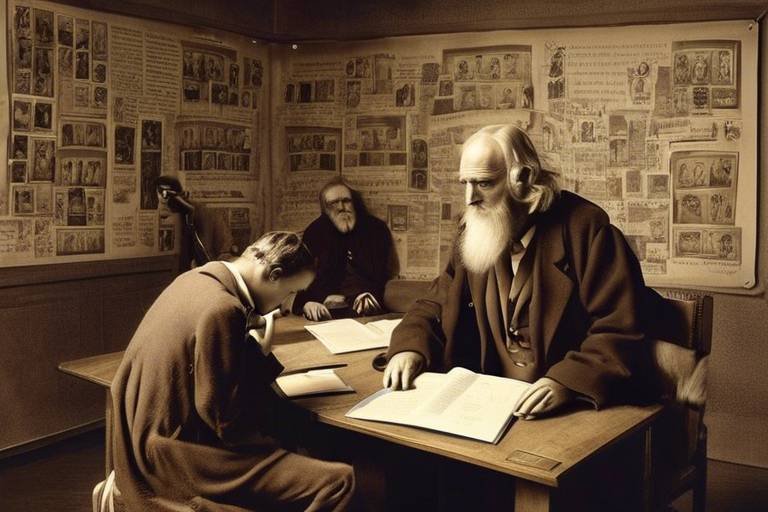Kant's Influence on Modern Astrophysics
When we think about the vastness of the universe, it’s easy to feel overwhelmed. But did you know that some of our understanding of this cosmic expanse can be traced back to the philosophical musings of Immanuel Kant? Yes, that’s right! Kant, a name often associated with deep philosophical debates, has left a profound mark on the field of modern astrophysics. His ideas about space, time, and the nature of reality have not only shaped scientific inquiry but have also encouraged a new way of thinking about our place in the cosmos.
Kant's influence is particularly evident in how we perceive the structure of the universe. He proposed that space and time are not merely physical dimensions but are instead forms of human intuition. This groundbreaking idea challenged traditional notions and paved the way for innovative interpretations of cosmic phenomena. Imagine trying to grasp the concept of infinity or the curvature of space without considering how our minds perceive these dimensions. Kant's philosophy acts as a bridge, connecting abstract thought with tangible scientific exploration.
Furthermore, Kant’s cosmological argument for the existence of the universe prompts us to ponder profound questions about origins and existence. It’s like standing at the edge of a vast ocean, wondering what lies beyond the horizon. This philosophical lens encourages modern scientists to not only seek empirical evidence but to also engage with the deeper implications of their findings. As astrophysicists explore the cosmos, they often find themselves grappling with questions that extend beyond the physical realm, echoing Kant’s insistence on the importance of reason in understanding the universe.
In today’s world, where science and philosophy often seem at odds, Kant’s legacy reminds us of the value of interdisciplinary approaches. By integrating philosophy with scientific inquiry, we can foster a richer understanding of complex cosmic questions. This collaboration can lead to groundbreaking discoveries and insights that neither discipline could achieve alone. For instance, as astrophysicists study phenomena like black holes or dark matter, they are also engaging with questions of existence and reality that Kant so passionately explored.
As we delve deeper into the cosmos, it’s essential to remember Kant’s assertion that there are limits to human understanding. This humbling notion encourages scientists to approach their research with a sense of curiosity and respect for the mysteries that still elude us. Just as Kant challenged his contemporaries to think critically, modern astrophysicists are urged to remain open to new ideas and perspectives, recognizing that the universe is full of surprises waiting to be uncovered.
In conclusion, Kant's influence on modern astrophysics is not just a historical footnote; it is a living legacy that continues to shape our understanding of the universe. His ideas challenge us to think critically, embrace interdisciplinary collaboration, and remain humble in our quest for knowledge. So, the next time you gaze up at the stars, remember that the philosophical foundations laid by Kant are still guiding our journey through the cosmos.
- How did Kant's philosophy influence modern science? Kant's ideas about space, time, and the limits of human understanding have encouraged scientists to think critically and embrace a more philosophical approach to their research.
- What is the significance of Kant's cosmological argument? Kant's cosmological argument invites scientists to explore the origins and structure of the universe through a philosophical lens, prompting deeper inquiry into existence itself.
- How can philosophy and science work together in astrophysics? By integrating philosophical inquiry with scientific exploration, researchers can address complex cosmic questions that require both empirical evidence and abstract reasoning.

The Nature of Space and Time
Kant's revolutionary ideas about space and time have fundamentally reshaped our understanding of the universe. He proposed that these dimensions are not merely external realities but rather forms of human intuition. This means that our perception of space and time is shaped by the way we experience the world, rather than being purely objective attributes of the universe. Imagine trying to understand a painting without stepping back to see the entire canvas; Kant believed that our minds inherently organize experiences in a way that allows us to grasp the cosmos.
His assertion that space and time are a priori intuitions challenges the classical view that they exist independently of our perceptions. This idea has paved the way for modern astrophysics, encouraging scientists to rethink traditional notions. For instance, the concept of relativity introduced by Einstein aligns with Kant's perspective, suggesting that the fabric of space and time is intertwined with the observer's frame of reference. It’s like realizing that the way you perceive a movie changes based on where you sit in the theater—different angles, different experiences!
Furthermore, Kant's insights encourage astrophysicists to explore cosmic phenomena beyond the surface level. They inspire questions like:
- How does our perception of time affect our understanding of cosmic events?
- In what ways do our spatial intuitions limit our comprehension of the vast universe?
By embracing Kant's philosophy, scientists are not only investigating the physical properties of space and time but also delving into how these concepts influence our understanding of the universe's structure. This philosophical lens opens up a myriad of interpretations, allowing for a richer exploration of black holes, dark matter, and the very fabric of reality itself.
In conclusion, Kant's perspective on space and time is not just a historical footnote; it remains a vital part of the conversation in modern astrophysics. By recognizing the interplay between human intuition and cosmic reality, scientists are better equipped to unravel the mysteries of the universe. It’s a reminder that in the quest for knowledge, we must consider not only what we observe but also how we observe it.

Kant's Cosmological Argument
Immanuel Kant's cosmological argument is a fascinating exploration of the existence and nature of the universe. Rather than simply asserting that the universe must exist, Kant delves into the very fabric of reality, prompting us to consider why there is something rather than nothing. His approach is not merely philosophical; it intertwines with the scientific inquiries that modern astrophysicists engage in today. By questioning the origins of the universe, Kant invites us to ponder the fundamental principles that govern existence itself. This inquiry is akin to peeling back the layers of an onion—each layer revealing deeper insights into the cosmic mysteries that surround us.
Kant posited that our understanding of the universe is inherently linked to our perception of it. He argued that the universe is not just a collection of objects in space but a structured entity that we can comprehend through reason. This perspective has profound implications for astrophysics, where the quest to understand cosmic phenomena often begins with philosophical questions. For instance, consider the question of causality: if every effect has a cause, what caused the universe itself? Kant's exploration of this question has prompted scientists to re-evaluate their theories about the origins of the cosmos, leading to discussions about the Big Bang and other cosmological models.
One of the most significant contributions of Kant's cosmological argument is his emphasis on the necessity of a first cause. He argued that if we trace back the chain of causes and effects, we must eventually arrive at an uncaused cause—something that exists independently and is not contingent upon anything else. This idea resonates with many modern theories in astrophysics that seek to explain the universe's inception. In fact, the concept of a singularity at the beginning of the universe aligns closely with Kant's notion of a first cause, bridging the gap between philosophy and empirical science.
Furthermore, Kant's argument encourages a holistic view of the universe. He believed that understanding the cosmos requires integrating various fields of knowledge, from philosophy to mathematics to the physical sciences. This interdisciplinary approach is echoed in contemporary astrophysical research, where collaboration among scientists, philosophers, and mathematicians is essential for tackling complex cosmic questions. By fostering this collaborative spirit, Kant's ideas continue to shape the way we explore the universe.
In summary, Kant's cosmological argument is not just a relic of philosophical discourse; it is a vital part of the ongoing dialogue in modern astrophysics. His insights push us to think critically about the nature of existence and the universe's origins. As we grapple with questions about the cosmos, Kant's legacy serves as a guiding light, reminding us that the pursuit of knowledge is both a scientific and philosophical endeavor.
- What is Kant's cosmological argument? Kant's cosmological argument posits that the existence of the universe necessitates a first cause, which is uncaused and independent.
- How does Kant's argument influence modern astrophysics? Kant's ideas encourage a philosophical framework for understanding the universe, prompting scientists to consider the origins and structure of cosmic phenomena.
- What is the significance of the first cause in Kant's argument? The first cause is essential to Kant's argument as it provides a foundation for understanding the existence of the universe beyond mere physical explanations.
- How does Kant's work promote interdisciplinary approaches? Kant advocated for integrating various fields of knowledge, which fosters collaboration between scientists and philosophers in modern astrophysical research.

The Role of Reason in Science
Immanuel Kant's philosophy fundamentally reshaped how we perceive the universe, particularly through his emphasis on the importance of reason in scientific inquiry. Kant believed that human understanding is not merely a passive reception of sensory data but an active process that requires rational thought to interpret and make sense of the complexities of existence. This idea resonates deeply within the realm of modern astrophysics, where scientists are not just collecting data about distant stars and galaxies; they are also applying rigorous logical frameworks to derive meaningful conclusions from their observations.
In Kant's view, reason serves as a guiding light in the dark expanse of the unknown, illuminating pathways to understanding that might otherwise remain obscured. This perspective encourages astrophysicists to engage in a continuous dialogue between empirical evidence and theoretical constructs. For example, when faced with anomalies such as dark matter or dark energy, scientists are challenged to use their reasoning skills to formulate hypotheses that can be tested against observable phenomena. This interplay between reason and evidence is not just a methodological approach; it is a philosophical commitment to seeking truth in a universe that often defies our intuitions.
Moreover, Kant's insistence on the role of reason extends beyond individual scientific endeavors. It fosters a collaborative environment where interdisciplinary approaches thrive. Astrophysicists, mathematicians, and philosophers often come together to tackle the most profound questions about the universe, such as:
- What is the nature of black holes?
- How did the universe originate?
- What are the implications of quantum mechanics for our understanding of reality?
These questions illustrate the necessity of combining different fields of knowledge, all anchored by the same rational principles that Kant championed. In this way, reason acts as a bridge connecting diverse disciplines, allowing for a richer exploration of cosmic mysteries.
Furthermore, the role of reason in science also invites a degree of humility. Kant argued that while we strive for understanding, we must recognize the limitations of our knowledge. This acknowledgment is crucial for astrophysicists as they venture into the vast unknown, where the answers are not always clear-cut. It is a reminder that, despite our sophisticated tools and technologies, there are still profound mysteries that may elude our grasp. This humility can inspire a sense of wonder and curiosity, motivating scientists to keep pushing the boundaries of what we know.
In summary, Kant's insights into the role of reason in science have left an indelible mark on modern astrophysics. By advocating for a rational approach to understanding the universe, he has encouraged scientists to blend empirical research with philosophical inquiry, fostering an environment ripe for discovery and innovation. As we continue to explore the cosmos, Kant's legacy serves as a constant reminder of the power of reason in our quest for knowledge.
- What is Kant's view on the relationship between reason and empirical evidence?
Kant believed that reason should guide the interpretation of empirical evidence, creating a synergy between observation and rational thought. - How does Kant's philosophy influence modern scientific methods?
Kant's emphasis on rational inquiry encourages scientists to adopt logical frameworks, ensuring that theories are both testable and grounded in evidence. - Why is humility important in scientific exploration according to Kant?
Kant argued that acknowledging the limits of human understanding fosters a sense of humility, which is essential for ongoing inquiry into the universe's mysteries.

Critical Philosophy and Empirical Evidence
Immanuel Kant's philosophy, particularly his critical philosophy, emphasizes the necessity of integrating empirical evidence with rational thought. This principle is crucial in the realm of astrophysics, where observations of the cosmos must be interpreted through a lens of logical reasoning. Kant posited that while our senses provide us with data about the universe, it is our reason that allows us to make sense of that data. This dual approach is not merely academic; it has profound implications for how scientists conduct research today.
For instance, consider the vastness of space. Astrophysicists rely on telescopes to gather light from distant galaxies, yet it is through the application of mathematical models and theoretical frameworks that they can derive meaningful conclusions from this data. Kant's assertion that knowledge is constructed from both sensory experiences and rational deduction is vividly illustrated in this process. Without a robust philosophical foundation, the empirical data collected could lead to misinterpretations or unfounded conclusions.
Moreover, Kant's critical philosophy encourages scientists to remain skeptical and to question their assumptions. In the world of astrophysics, where phenomena can often defy our intuitive understanding, this skepticism is vital. For example, the discovery of dark matter and dark energy has challenged traditional views of gravity and mass in the universe. Here, Kant's influence is evident; astrophysicists must not only gather evidence but also engage in rigorous logical reasoning to develop theories that can accommodate these mysterious components of the cosmos.
In practical terms, Kant's philosophy can be seen in the methodologies employed in modern astrophysics. Researchers often engage in a cyclical process of hypothesis formulation, empirical testing, and revision of theories based on new evidence. This iterative approach mirrors Kant's idea that knowledge is not static but evolves through critical examination and empirical validation. By adhering to this philosophy, scientists can ensure that their conclusions about the universe are not just speculative but grounded in observable reality.
Furthermore, Kant's emphasis on empirical evidence has led to the establishment of rigorous standards in scientific research. For instance, peer review processes and reproducibility of experiments are fundamental to ensuring that findings in astrophysics are credible and reliable. This commitment to empirical validation is a direct reflection of Kant's belief that knowledge must be anchored in experience, thereby reinforcing the integrity of scientific inquiry.
In conclusion, Kant's critical philosophy serves as a cornerstone for the integration of empirical evidence and rational thought in astrophysics. By championing the interplay between observation and reason, Kant has not only shaped the methodologies of modern science but has also instilled a sense of responsibility among scientists to pursue knowledge with both rigor and humility. This dual commitment is essential as we continue to unravel the mysteries of the universe.
- What is Kant's critical philosophy?
Kant's critical philosophy emphasizes the relationship between empirical evidence and rational thought, advocating that knowledge arises from both sensory experience and logical reasoning.
- How has Kant influenced modern astrophysics?
Kant's ideas encourage scientists to integrate empirical data with rigorous reasoning, fostering a scientific approach that values both observation and theoretical frameworks.
- Why is empirical evidence important in astrophysics?
Empirical evidence is crucial because it provides the data necessary to support or refute scientific theories, ensuring that conclusions about the universe are based on observable phenomena.
- What role does skepticism play in scientific inquiry?
Skepticism encourages scientists to question their assumptions and remain open to new evidence, which is vital for the advancement of knowledge in fields like astrophysics.

Limits of Human Understanding
Immanuel Kant, with his profound philosophical insights, posited that there are intrinsic limits to human understanding. This notion is not just a whimsical idea; it serves as a cornerstone for modern astrophysics. Imagine standing at the edge of a vast ocean, gazing at the horizon. You can see the waves, feel the breeze, but the depths of the ocean remain a mystery. Similarly, Kant suggests that while we can observe and interpret the universe, there are aspects that may forever elude our grasp.
Kant's assertion that our understanding is limited stems from his belief that human cognition is shaped by our sensory experiences and the frameworks through which we interpret them. In the realm of astrophysics, this idea challenges scientists to recognize that their theories and models are, in essence, constructs of the human mind, influenced by our perceptions and experiences. For instance, when we talk about concepts like black holes or dark matter, we often rely on mathematical models and theoretical frameworks that, while robust, may not capture the full essence of these phenomena. This leads to a critical question: Are we merely scratching the surface of a much deeper reality?
Moreover, Kant's philosophy encourages a certain humility among astrophysicists. In their quest to unravel the mysteries of the cosmos, scientists must acknowledge that their current understanding may be limited by the very tools and methods they employ. This awareness fosters an environment where questioning and re-evaluating established theories becomes essential. For example, consider the evolution of our understanding of the universe from a static model to one that is dynamic and ever-expanding. Each step forward is a testament to the limitations of previous paradigms, urging scientists to remain open-minded.
To illustrate this further, let’s take a look at some of the key areas where Kant's ideas about the limits of human understanding resonate within astrophysics:
| Aspect | Implication in Astrophysics |
|---|---|
| Perception | Our sensory limitations affect how we observe cosmic phenomena. |
| Conceptual Frameworks | The theories we develop may not encompass all aspects of the universe. |
| Scientific Method | Encourages continuous questioning and re-evaluation of existing theories. |
| Humility | Scientists must remain aware of their cognitive limits in understanding the cosmos. |
In conclusion, Kant’s exploration of the limits of human understanding is not just a philosophical musing; it is a guiding principle for astrophysicists. It invites them to embrace uncertainty, to question their assumptions, and to remain ever-curious about the universe. As we continue to explore the vastness of space, let us carry with us the wisdom of Kant, reminding ourselves that while we may uncover many secrets, the universe will always hold mysteries that challenge our understanding.
- What did Kant mean by the limits of human understanding?
Kant believed that human cognition is shaped by sensory experiences, implying that there are aspects of reality that may be beyond our comprehension. - How does Kant's philosophy influence modern astrophysics?
Kant's ideas encourage scientists to recognize the limitations of their theories and promote a culture of questioning and humility in scientific inquiry. - Can we ever fully understand the universe?
While we may uncover many aspects of the universe, Kant's philosophy suggests that some mysteries may remain forever elusive.

Ethics and Scientific Responsibility
Kant's ethical framework is not just a relic of philosophical musings; it resonates deeply within the realms of modern science, particularly in astrophysics. His principle of treating humanity as an end in itself rather than a means to an end pushes scientists to consider the broader implications of their work. Imagine standing at the edge of the universe, gazing into the vast unknown, but then realizing that every discovery has a ripple effect on society and the environment. This perspective is crucial for astrophysicists, who often find themselves grappling with the moral dimensions of their research.
In today's world, where scientific advancements can lead to both incredible benefits and unforeseen consequences, Kant's emphasis on ethical responsibility is more relevant than ever. For instance, when researchers explore topics such as climate change, space exploration, or even the potential for extraterrestrial life, they must weigh the ethical implications of their findings. This means asking questions like: How will our discoveries affect future generations? Are we respecting the natural world while we seek to understand it? Are we prepared for the potential consequences of our technological advancements?
Moreover, Kantian ethics encourages a culture of transparency and accountability in scientific research. Astrophysicists are urged to communicate their findings honestly and to consider the societal impact of their work. For example, when a new theory about dark matter or black holes emerges, scientists must engage with the public, explaining the significance of their research in a way that is accessible and understandable. This not only fosters public trust but also encourages a more informed discourse around scientific topics.
To illustrate the importance of ethics in astrophysics, consider the following table that outlines key ethical considerations in scientific research:
| Ethical Consideration | Description |
|---|---|
| Integrity | Ensuring honesty and transparency in research practices. |
| Responsibility | Recognizing the impact of scientific findings on society and the environment. |
| Respect for Nature | Understanding and valuing the natural world while conducting research. |
| Public Engagement | Communicating scientific discoveries to the public effectively and responsibly. |
In essence, Kant's ethical framework acts as a guiding light for astrophysicists navigating the complexities of their field. It serves as a reminder that while the quest for knowledge is paramount, the responsibility that comes with it cannot be overlooked. As we venture further into the cosmos, let us remember that every star we study and every theory we propose carries with it a moral weight. The universe may be vast and mysterious, but our commitment to ethical scientific exploration ensures that our understanding of it is grounded in respect, responsibility, and a genuine concern for the greater good.
- What is the significance of Kant's ethical framework in modern astrophysics?
Kant's ethical framework emphasizes the importance of responsibility and integrity in scientific research, urging astrophysicists to consider the societal and environmental impacts of their work. - How can astrophysicists engage with the public about their findings?
Astrophysicists can engage with the public by communicating their discoveries in an accessible manner, fostering public trust and understanding of scientific concepts. - Why is it important to respect nature in scientific research?
Respecting nature is crucial to ensure that scientific advancements do not harm the environment or disrupt natural ecosystems, aligning with Kant's principle of treating humanity and nature with respect.

The Influence of the Enlightenment
The Enlightenment was a remarkable period that ushered in a wave of new ideas, and Immanuel Kant was at the forefront of this intellectual revolution. His philosophical inquiries not only challenged the status quo but also laid the foundation for a scientific worldview that continues to resonate in modern astrophysics. During this era, thinkers began to prioritize reason, empirical evidence, and the potential for human progress, which profoundly influenced the way we explore the cosmos today.
Kant's philosophy was pivotal in shaping the Enlightenment's core principles, such as the belief in the power of human reason. He argued that through reason, humans could unlock the secrets of the universe. This idea was revolutionary because it shifted the focus from purely theological explanations of the cosmos to a more scientific approach based on observation and rational thought. For instance, Kant's assertion that the universe operates according to natural laws inspired later scientists to seek out these laws through rigorous experimentation and observation.
Moreover, Kant's emphasis on the importance of interdisciplinary dialogue between philosophy and science has had lasting implications for astrophysics. He believed that philosophical inquiry could complement scientific investigation, leading to a more profound understanding of the universe. This integration is evident today, as astrophysicists often collaborate with philosophers to tackle complex questions about existence, reality, and the nature of the universe. Such collaboration allows for a more holistic approach, blending empirical data with philosophical reasoning.
Another significant aspect of Kant's influence during the Enlightenment was his advocacy for critical thinking. He challenged scholars to question established beliefs and to seek evidence for their claims. This principle remains a cornerstone of scientific inquiry in astrophysics. By encouraging skepticism and rigorous analysis, Kant's ideas have paved the way for groundbreaking discoveries that challenge our understanding of the universe. For example, the development of theories such as relativity and quantum mechanics can be traced back to the kind of critical, questioning mindset that Kant championed.
In conclusion, the Enlightenment was a transformative period that shaped modern thought, and Kant's contributions were instrumental in this evolution. His ideas continue to inspire astrophysicists to explore the universe with a combination of reason, empirical evidence, and philosophical inquiry. As we delve deeper into the cosmos, the legacy of the Enlightenment and Kant's influence remind us that the quest for knowledge is not just about discovering facts, but also about understanding the broader implications of those discoveries on our understanding of existence itself.
- What was the Enlightenment? The Enlightenment was an intellectual movement in the 17th and 18th centuries that emphasized reason, individualism, and skepticism of traditional authority.
- How did Kant influence modern science? Kant influenced modern science by promoting the use of reason and critical thinking, encouraging a scientific approach to understanding the universe.
- What is the significance of interdisciplinary approaches in astrophysics? Interdisciplinary approaches allow for collaboration between different fields, leading to a more comprehensive understanding of complex cosmic questions.
- How do Kant's ideas relate to contemporary astrophysics? Kant's ideas about the nature of space, time, and the limits of human understanding continue to resonate in current discussions and research in astrophysics.

Interdisciplinary Approaches
In the realm of modern astrophysics, the integration of various disciplines is not just beneficial; it's essential. Kant's philosophy serves as a bridge between the realms of science and the humanities, encouraging astrophysicists to step beyond the confines of their own fields. This interdisciplinary approach fosters a richer understanding of the universe, as it combines the analytical rigor of science with the reflective depth of philosophy. Imagine trying to solve a complex puzzle with only a few pieces; without insights from different perspectives, the picture remains incomplete.
Astrophysics is inherently complex, involving concepts that challenge our perceptions of reality. By inviting philosophers into the conversation, scientists can explore the fundamental questions that underpin their research. For instance, when pondering the nature of black holes or the origins of dark matter, a philosophical inquiry into existence and reality can provide essential context. Kant's emphasis on the limits of human understanding reminds us that while we strive for knowledge, there are dimensions of the universe that may elude our grasp. This humility encourages collaboration across disciplines, leading to innovative solutions and new ways of thinking.
Moreover, interdisciplinary approaches can enhance educational frameworks, inspiring a new generation of scientists and thinkers. By incorporating philosophical discussions into astrophysics curricula, students can develop critical thinking skills that are vital for tackling the complexities of the cosmos. This collaboration can take various forms, such as:
- Joint Research Initiatives: Projects that bring together astrophysicists and philosophers to explore questions like the nature of time, the concept of infinity, or the implications of the multiverse theory.
- Conferences and Workshops: Events that encourage dialogue between disciplines, allowing for the exchange of ideas and fostering a community that values diverse perspectives.
- Public Outreach Programs: Initiatives that aim to educate the public about the philosophical implications of astrophysical discoveries, making complex ideas accessible and engaging.
Ultimately, Kant's legacy encourages a holistic view of knowledge where boundaries blur, and collaboration thrives. This synergy not only enriches our understanding of the universe but also reflects a broader truth: that the pursuit of knowledge is a collective journey. As we continue to explore the cosmos, embracing interdisciplinary approaches ensures that we remain open to new ideas, fostering a culture of inquiry that is as expansive as the universe itself.
Q: How does Kant's philosophy influence modern astrophysics?
A: Kant's ideas about space, time, and the limits of human understanding encourage a more reflective approach to scientific inquiry, prompting astrophysicists to consider philosophical implications in their research.
Q: Why is interdisciplinary collaboration important in astrophysics?
A: Interdisciplinary collaboration allows for diverse perspectives, leading to innovative solutions and a more comprehensive understanding of complex cosmic phenomena.
Q: What are some examples of interdisciplinary approaches in astrophysics?
A: Examples include joint research projects between astrophysicists and philosophers, conferences that facilitate dialogue, and public outreach programs that educate about the philosophical implications of scientific discoveries.

Legacy in Contemporary Thought
Immanuel Kant's philosophical legacy profoundly influences contemporary thought, particularly in the realm of astrophysics. His ideas resonate with modern debates about the nature of reality, existence, and the fundamental principles governing the universe. Kant's assertion that our understanding of the cosmos is shaped by both empirical observation and rational thought has paved the way for a more nuanced approach to scientific inquiry. Today, astrophysicists grapple with questions that echo Kant's inquiries, such as: What is the nature of space and time? How do our perceptions influence our understanding of the universe? These questions are not merely academic; they are essential to the ongoing exploration of cosmic phenomena.
Moreover, Kant's emphasis on the limits of human understanding remains a cornerstone of scientific humility. Astrophysicists are continually reminded that while we strive to unlock the mysteries of the universe, there are boundaries to our comprehension. This acknowledgment fosters a culture of inquiry that values questions as much as answers, encouraging scientists to remain open to new ideas and perspectives. For instance, the ongoing exploration of dark matter and dark energy reflects this Kantian spirit, as researchers recognize that much of the universe eludes direct observation yet is crucial for a complete understanding of cosmic dynamics.
In addition, Kant's ethical framework has significant implications for how contemporary scientists approach their work. As the impact of scientific research on society and the environment becomes increasingly evident, astrophysicists are urged to consider the moral dimensions of their discoveries. The ethical considerations surrounding space exploration, planetary protection, and the potential consequences of technological advancements echo Kant's insistence on moral responsibility. Thus, his ideas not only shape theoretical discussions but also influence practical applications in the field.
Furthermore, the interdisciplinary nature of Kant's philosophy encourages collaboration between various fields of study. In modern astrophysics, this interdisciplinary approach is vital. Scientists often find themselves working alongside philosophers, ethicists, and even artists to explore complex questions about existence and reality. This collaboration fosters a richer understanding of the universe, as diverse perspectives contribute to a more comprehensive view of cosmic phenomena.
In conclusion, Kant's legacy in contemporary thought is a testament to the enduring power of philosophy in shaping scientific inquiry. His ideas continue to inspire astrophysicists and philosophers alike, driving them to explore the cosmos with a blend of curiosity, ethical consideration, and intellectual rigor. As we venture further into the universe, Kant's influence serves as a guiding light, reminding us that the quest for knowledge is as much about understanding ourselves as it is about understanding the stars.
- How did Kant influence modern astrophysics?
Kant's ideas about space, time, and the limits of human understanding have shaped how contemporary astrophysicists approach their studies. - What is the significance of Kant's ethical framework in science?
Kant's emphasis on moral responsibility encourages scientists to consider the societal and environmental impacts of their research. - Why is interdisciplinary collaboration important in astrophysics?
Kant's philosophy promotes the integration of different fields, leading to a more comprehensive understanding of complex cosmic questions.
Frequently Asked Questions
- How did Kant's views on space and time influence modern astrophysics?
Kant's revolutionary ideas about space and time as forms of human intuition laid a foundational framework for modern astrophysics. By challenging traditional notions, his philosophy opened the door for new interpretations of cosmic phenomena, allowing scientists to explore concepts that were previously unthinkable.
- What is Kant's cosmological argument, and how does it relate to astrophysics?
Kant's cosmological argument posits that there must be a sufficient reason for the existence of the universe. This perspective has significantly influenced modern astrophysical discussions, prompting researchers to rethink the origins and structure of the cosmos through a philosophical lens, rather than solely relying on empirical data.
- Why is reason important in Kant's philosophy and how does it affect scientific research?
Kant emphasized the role of reason as a critical component in understanding the universe. This idea has inspired modern astrophysicists to adopt rigorous logical frameworks in their research, ensuring that their theories are not only based on observations but also on sound reasoning.
- What does Kant mean by the limits of human understanding?
Kant argued that there are inherent limits to what humans can comprehend about the universe. This notion encourages astrophysicists to approach their studies with humility, recognizing that some mysteries may remain beyond the reach of human understanding, no matter how advanced our technologies become.
- How does Kant's ethical framework apply to modern scientific responsibility?
Kant's ethical philosophy urges scientists, including astrophysicists, to consider the moral implications of their research. This means being aware of how their work impacts society and the environment, fostering a sense of responsibility in their scientific endeavors.
- What role did the Enlightenment play in shaping Kant's ideas?
The Enlightenment was a pivotal period that shaped Kant's thinking, as it emphasized reason, science, and individualism. His contributions to this intellectual movement laid the groundwork for a scientific worldview that continues to influence astrophysical inquiry and exploration today.
- How do Kant's ideas promote interdisciplinary approaches in astrophysics?
Kant's integration of philosophy and science encourages collaboration across disciplines. This interdisciplinary approach allows scientists and philosophers to work together to tackle complex questions about the cosmos, leading to richer insights and more comprehensive understandings of universal phenomena.
- In what ways does Kant's legacy persist in contemporary astrophysical thought?
Kant's influence can still be felt in modern discussions about the nature of reality, existence, and the fundamental principles of the universe. His ideas resonate with current debates, highlighting the ongoing relevance of his philosophical contributions to the field of astrophysics.



















